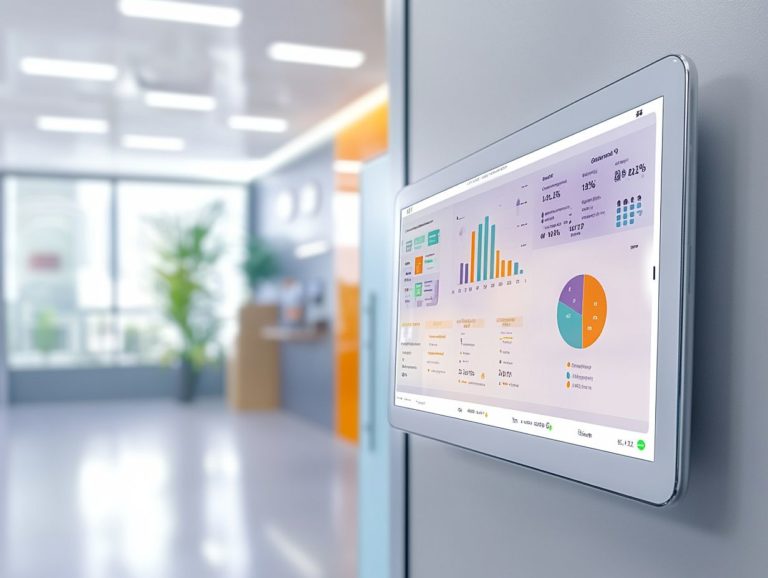78. How CRM Drives Efficiency in the Manufacturing Sector
In today s fast-paced manufacturing landscape, integrating Customer Relationship Management (CRM) systems can significantly improve your operations.
By streamlining processes, enhancing customer interactions, and driving efficiency, CRM becomes essential for any manufacturer aiming to flourish. This article delves into the many benefits of CRM, highlighting how it can boost efficiency, reduce costs, and foster strong customer relationships.
You ll discover key implementation steps, navigate common challenges, and explore real-life success stories that demonstrate how CRM can transform your manufacturing practices.
Get ready to discover how CRM can transform your manufacturing business!
Contents
Key Takeaways:

CRM improves efficiency and saves costs. Companies can streamline processes and cut expenses.
Effective CRM use in manufacturing leads to better customer relationships and satisfaction, resulting in increased loyalty and repeat business.
Implementing CRM requires careful planning but can yield significant benefits, as seen in real-life case studies.
What is CRM and How is it Used in Manufacturing?
Customer Relationship Management (CRM) in the manufacturing sector is more than just a strategy; it s your ticket to optimizing customer engagement through data, automation, and analytics.
By leveraging CRM software, you can streamline your processes, boost customer satisfaction, and unlock valuable insights into customer behavior all of which drive business growth. This digital transformation seamlessly integrates various operations, providing a comprehensive view of customer interactions and enhancing decision-making in sales and lead management.
With a robust CRM system, you can automate routine tasks, such as sending follow-up emails or managing inventory, allowing your sales teams to focus on what truly matters: building meaningful relationships instead of being bogged down by manual processes.
These tools enable precise analysis of customer feedback and behaviors, allowing you to tailor your products and services to meet specific needs effectively.
By fostering improved communication between your teams and customers, CRM enhances operational efficiency and cultivates loyalty, leading to repeat business. The ability to track customer journeys and identify trends keeps you agile in a competitive marketplace, positioning your organization for sustainable growth.
Benefits of CRM in the Manufacturing Sector

Implementing a robust CRM system in the manufacturing sector offers numerous advantages that elevate organizational performance and enhance customer satisfaction, as highlighted in 10 CRM solutions for efficient resource management.
With improved data analytics capabilities and streamlined sales processes, these systems enable you to adopt customer-centric strategies that drive growth and address compliance challenges effectively.
Efficiency and Cost Savings
A primary advantage of implementing CRM in manufacturing is the significant increase in efficiency and cost savings from effective CRM strategies that streamline processes and automation.
By automating routine tasks like order processing, inventory management, and customer follow-ups, these systems allow your manufacturing teams to focus on more strategic initiatives. This focus leads to reduced labor costs and quicker response times.
For example, when a CRM automatically generates reports on inventory levels, it significantly decreases the chances of overstocking or stockouts, helping you cut unnecessary expenses. Metrics like order cycle time and customer retention rates also see notable improvements, showcasing your operations’ agility.
This thoughtful integration boosts productivity and elevates customer satisfaction by ensuring timely service, creating a win-win scenario for businesses poised for growth.
Improved Customer Relationships

A well-implemented Customer Relationship Management (CRM) system helps you build stronger customer relationships. It does this by focusing on customer needs and enhancing their engagement and satisfaction.
By using data analytics, you can understand what individual customers prefer. This insight allows you to create personalized communications that truly resonate with your audience.
For example, a well-known outdoor gear company used its CRM to track purchase histories and customer preferences. This enabled them to launch tailored marketing campaigns, leading to a remarkable 20% increase in repeat purchases.
Integrating service automation tools also enables quicker response times, improving the overall service experience. A major telecommunications provider streamlined its support processes through CRM, which reduced resolution times and significantly improved customer loyalty.
These strategies illustrate how effective CRM implementation can build lasting customer relationships, helping you stand out in a competitive market.
Implementing CRM in Manufacturing
To successfully implement CRM in manufacturing, you need a comprehensive approach. This includes strategic planning, integrating essential tools, and following clear steps to boost operational efficiency and customer engagement.
Begin by setting clear goals and selecting CRM software that meets the unique needs of the manufacturing industry.
Key Steps and Considerations

Key steps for implementing CRM in manufacturing include evaluating current processes, identifying specific business needs, and choosing the right software with the necessary features and integrations.
Start with a thorough needs assessment. This involves reviewing existing workflows to identify gaps that a CRM solution can fill.
The next important phase is selecting software. Prioritize factors like scalability, customization options, and compatibility with your current systems.
Ensuring compliance with data privacy regulations is crucial, as mishandling sensitive information can have serious consequences.
Don t forget about employee training. A robust training program will significantly improve user adoption rates and enhance overall system effectiveness, leading to smoother operations and better customer interactions.
Challenges and Solutions for CRM in Manufacturing
Implementing CRM in the manufacturing sector comes with challenges, including data privacy concerns, compliance issues, and resistance to digital transformation.
By acknowledging these obstacles, you can develop effective strategies that enhance customer relationships while ensuring operational integrity.
Embracing this journey not only strengthens your organization s ties with customers but also positions you to succeed in an increasingly digital world.
Common Obstacles and How to Overcome Them
Common obstacles in CRM implementation for manufacturing include poor data integration, low user adoption, and challenges in meeting industry regulations. These hurdles can hinder both operational efficiency and customer relationship management.
For instance, when different systems fail to communicate effectively, it can lead to inaccurate customer data, compromising decision-making and customer satisfaction.
To address user adoption challenges, implement comprehensive employee training programs that emphasize the CRM system’s benefits. This will help your team feel confident using the software.
Choosing compliant software with built-in regulatory features can simplify processes and minimize risks related to non-compliance. By prioritizing these strategies, you can establish a smoother and more effective CRM implementation.
Case Studies of Successful CRM Implementation in Manufacturing
Delving into real-life case studies of CRM implementation in the manufacturing sector uncovers invaluable insights. Organizations can achieve remarkable results through strategic customer relationship management.
These investigations highlight best practices and innovative approaches that can transform customer interactions and drive success.
Real-Life Examples and Results
Examples of successful CRM implementation in manufacturing offer compelling insights into effective strategies. These strategies can significantly enhance customer engagement and operational efficiency.
For instance, a well-known automotive parts manufacturer faced challenges in managing customer relationships and tracking sales leads across diverse regions. By adopting a robust CRM system, they centralized their customer data. This enabled streamlined communication and a deeper understanding of client needs.
As a direct result, they achieved an impressive 30% increase in customer retention and a 20% boost in sales within just the first year.
Similarly, a textile manufacturer utilized CRM tools to personalize marketing efforts, successfully overcoming initial data fragmentation. This strategic initiative translated into a 25% rise in overall revenue, showcasing the transformative potential of well-executed CRM practices.
Frequently Asked Questions
- What is CRM and how does it drive efficiency in the manufacturing sector?
Customer Relationship Management (CRM) is a system that helps businesses manage their interactions with customers and potential customers. In manufacturing, CRM drives efficiency by streamlining processes, improving communication, and providing valuable insights into customer needs. - How does CRM improve communication within a manufacturing company?
CRM provides a centralized database of customer information accessible by all departments. This enhances communication, as everyone can work together to meet customer needs and resolve issues quickly. - How does CRM help with streamlining processes in the manufacturing sector?
CRM automates many tasks, such as data entry and customer communication. This free time for employees reduces errors and speeds up processes. - What are key features of CRM that make it efficient for manufacturing?
Key features include lead management, sales forecasting, inventory management, and customer service management. These help businesses stay organized and make data-driven decisions. - How does CRM help with customer retention in manufacturing?
CRM tracks customer interactions and provides insights into preferences. This allows businesses to personalize communication, leading to improved customer satisfaction and retention. - What challenges arise when implementing CRM in manufacturing?
Common challenges include employee resistance to change, data management issues, and the need for proper training. However, these can be overcome with effective planning and implementation strategies.
In conclusion, effective CRM implementation can revolutionize customer engagement and operational efficiency in the manufacturing sector. Discover how CRM can transform your business today!






